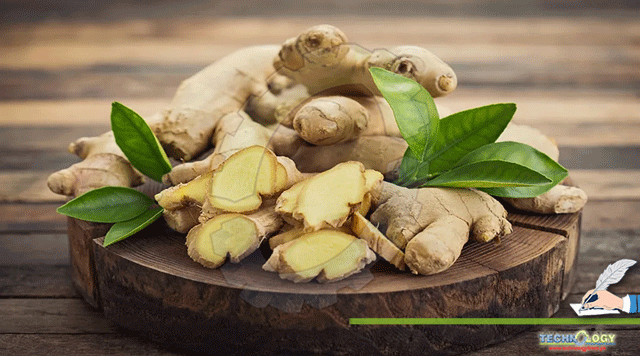Ginger (Zingiber Officinale Roscoe) the rhizome of Zingiber officinale, it is a common spice used in cuisines, sweets, and cocktails all around the world.

By Atika Khan, Safura Bibi
Scientific name: Zingiber officinale
Common name: Ginger
Family: Zingiberaceae
The rhizome of ginger grows horizontally, with a yellow or brown outer membrane evident. The rhizome’s inner membrane is yellowish brown and has numerous vascular components and cells that contain glycosides. Ginger has a pleasant smell and a spicy aroma, and the dried powder is yellowish white to yellowish brown in appearance. This Asian plant has been utilized in the prevention and treatment of numerous ailments since old period. In this review, we look at those studies and their potential enzymatic and molecular processes for how ginger affects lipid profiles. Blood lipid levels that are too high are the primary factor of atherosclerosis that ultimately cause cardiovascular disease. Ginger has been utilized as a lipid-lowering agent in several trials.
Ginger’s medicinal effects have been known for over 2000 years. Ginger can be considered a delicacy supplements, beverages, and foods such as sweets and jams. Ginger and its separated constituents have pharmacological actions that include immunological control, anti-tumor genesis, anti-inflammatory, anti-apoptosis, and anti-vomiting, surgery, chemotherapy, and dizziness can all lead to nausea, and the plant can help to remove these diseases. Ginger supplements are useful in pregnancy related to morning sickness. In addition, scientific evidence suggests that ginger has free radical scavenging and anti – thrombotic properties, as well as the ability to reduce pain.
The effect of ginger to control blood lipids:
Ginger can probably reduce the high amount of serum triglycerides. It may reduce the fat absorption to increase the intestinal peristalsis. By reducing the activity of critical enzymes, ginger also suppresses liver fatty acid and cholesterol production. Cardiovascular disease (CVD) is currently one of the world’s most pressing health care issues. Poor control of dyslipidemia is linked to a slew of issues that lower standard of health, increase death rates, and place a significant financial burden on society’s public health system. As a result, in patients with severe of CVD, proper dyslipidemia management is a crucial part of nutrition education. While some researchers have proved that ginger consumption has no therapeutic effect on blood lipid profiles. Ginger supplementation resulted in significant reductions in high density lipoprotein, total cholesterol (TC), and TAG according to various clinical assessments. There are two main kinds of cholesterol:
- low-density lipoprotein (LDL), also called “bad” cholesterol
- high-density lipoprotein (HDL) also called “good” cholesterol
Ginger supplements increased bile manufacturing from cholesterol into the liver, as well as increased cholesterol and phospholipid efflux in the stool after getting ginger. It could be a potential approach for ginger’s effects in lowering blood cholesterol. Patients with type 2 diabetes who ingested 2 and 3 grains of ginger per day for two months saw a decrease in blood pressure LDL-c.
- Human studies
Ginger treatment may be regarded as useful herbal therapy for lowering TAG and LDL-C, according to the contextual and current comprehensive study. For 12 weeks, diabetic sufferers were allocated randomly to the ginger or placebo groups and given 2 g of ginger powder complement or xylose as a placebo. For 8 weeks, daily ingestion of 3 grammes of ginger powder reduce serum LDL-c (P value=0.03) and raise APO A1 (P value=0.005), but has no effect on total cholesterol (P value=0.47). Ginger contains a variety of ingredients and chemical constituents that vary depending on age and birthplace. Although the efficacy of ginger on blood lipids may be altered by the frequency and length of the intervention.
Ginger has been shown to have beneficial benefits on TAG, TC, and HDL-C blood levels in people with diabetes and high cholesterol. Ginger can decrease the blood lipids through increasing pancreatic lipids, blocking gastrointestinal lipid degradation, and activating mechanisms involving peroxisome proliferator-activated receptors. Cholesterol can be converted to bile acids thus it decrease the serum level of cholesterol into the body. In typical dosages, ginger is a benign, affordable, and readily accessible traditional remedy with few adverse effects, and our findings support this type of homeopathic remedies. Different doses of ginger powder (range 1 to 3 grams) can be used in different time periods like 45 days to 12 weeks. According to our new findings, ginger consumption on lipid profile seems to be a valuable ingredient for modifying blood lipids, mainly for diabetic patients.
Traditional use
Ginger is known as sandhi in AYURVEDA. It can be used as appetizer as well as for local applications in pain. Its famous ayurvedic remedy is used to cure digestive disorders and at the same time it can reduce arthritis.
Medicinal properties of ginger
A number of study have been conducted which shows various medicinal properties of ginger.
- Hypolipidemic
- Anti-emetic
- Chemo protective
- Anti-viral
- Anti-inflammatory
- Anti-motion and Antinauseant
- Anti-ulcerogenic
- Reduce migraine problem
Side effects of Ginger:
Ginger is regarded as a safe medicinal herb. Moderate sensations like acidity and nausea, on the other hand, can be predicted as negative side effects.
- More than 6 g of ginger may cause gastric irritant and heartburn.
- Ginger may shorten the time it takes for blood to clot thus it should be used with precautions when used with anticoagulant drugs.
- Congestive heart failure (if over dosed).
- Soreness of the tongue.
- People who drink ginger water in excess amount may face different problems like gas, abdominal pain and diarrhea.